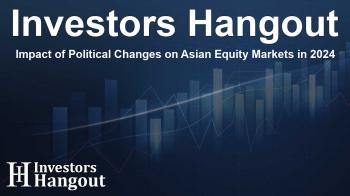Impact of Political Changes on Asian Equity Markets in 2024

Understanding Investor Sentiment in Asian Equity Markets
Recent changes in the geopolitical landscape have significantly impacted overseas investment in Asian equities. In the year 2024, many investors turned net sellers, largely driven by escalating concerns regarding the economic policies of U.S. President-elect Donald Trump.
Shifts in Investment Trends
Data shows that foreign investors sold a remarkable $15.8 billion worth of equities across key Asian markets, including Taiwan, South Korea, India, Thailand, Indonesia, Vietnam, and the Philippines. This is notable, especially considering that in 2023, they had been net buyers with investments totaling $26.6 billion.
Initial Confidence Followed by Caution
The investors had a positive outlook during the first three quarters of the previous year, investing approximately $14.67 billion, buoyed by expectations of an easing Federal Reserve and regional economic growth. However, as the dollar strengthened and U.S. yields increased, many turned to accelerated selling.
Regional Outflows and Key Players
Last year, Taiwan experienced the largest outflows, totaling $12.4 billion, while Thailand and Vietnam followed with $4.11 billion and $3.63 billion, respectively. Each of these countries faces complex challenges that could hinder foreign investments in the immediate future.
The Wider Economic Environment
According to Timothy Moe, an analyst at Goldman Sachs, the macroeconomic backdrop for Asian equities remains quite tough. The ongoing market headwinds include mixed economic indicators, increasingly high U.S. 10-year yields, and an even stronger dollar. Additionally, the possibility of new tariffs affecting Asia-Pacific economies has added to the uncertainty.
Global Comparisons and Market Performance
Competing markets have posed challenges for Asia, with the MSCI Asia Pacific index yielding only 7.23% in 2024, significantly lower than the MSCI World index's 15.73% and the MSCI United States' 23.4%. This disparity has drawn investors away from Asian equities, seeking higher returns elsewhere.
Anticipating Future Economic Policies
Trump's administration has announced plans for implementing substantial tariffs – a 10% tariff on all global imports and a staggering 60% tariff specifically on Chinese goods. These measures could ripple through and affect many Asian exporters due to their interconnected supply chains with China.
The Need for Clarity in Policies
Market strategist Yeap Jun Rong from IG suggests that while the potential for reduced tariffs exists, it may be too early to expect any significant alleviation of the current situation. The sentiment among investors appears cautious, as many prefer to wait for clearer policy outlines before making further investments.
Selective Investment Approach
As Jason Lui from BNP Paribas notes, foreign investors are likely to adopt a more selective approach in identifying markets and sectors to invest in. This is due to the anticipated divergence in performance across various Asian equity markets, heavily influenced by local policy agendas and sensitivity to U.S. monetary and trade policies.
Frequently Asked Questions
What contributed to the net selling of Asian equities in 2024?
Concerns regarding Trump's trade policies and a stronger dollar led to significant outflows from Asian equity markets.
Which countries experienced the most significant outflows?
Taiwan, Thailand, and Vietnam saw the largest foreign investment withdrawals, totaling billions in 2024.
How did U.S. economic policies affect Asian investments?
The expectations of higher tariffs and a stronger dollar caused uncertainty among foreign investors, leading to reduced investments.
What was the performance of the MSCI Asia Pacific index in 2024?
The MSCI Asia Pacific index yielded only 7.23% in 2024, significantly less than its global counterparts.
What strategies are foreign investors adopting moving forward?
Many are being more selective about where to invest, focusing on markets and sectors that align with their outlook on regional policies and economic conditions.
About Investors Hangout
Investors Hangout is a leading online stock forum for financial discussion and learning, offering a wide range of free tools and resources. It draws in traders of all levels, who exchange market knowledge, investigate trading tactics, and keep an eye on industry developments in real time. Featuring financial articles, stock message boards, quotes, charts, company profiles, and live news updates. Through cooperative learning and a wealth of informational resources, it helps users from novices creating their first portfolios to experts honing their techniques. Join Investors Hangout today: https://investorshangout.com/
Disclaimer: The content of this article is solely for general informational purposes only; it does not represent legal, financial, or investment advice. Investors Hangout does not offer financial advice; the author is not a licensed financial advisor. Consult a qualified advisor before making any financial or investment decisions based on this article. The author's interpretation of publicly available data shapes the opinions presented here; as a result, they should not be taken as advice to purchase, sell, or hold any securities mentioned or any other investments. The author does not guarantee the accuracy, completeness, or timeliness of any material, providing it "as is." Information and market conditions may change; past performance is not indicative of future outcomes. If any of the material offered here is inaccurate, please contact us for corrections.
